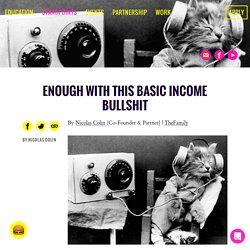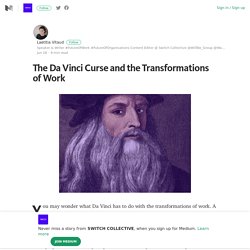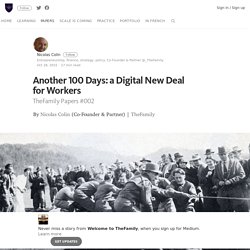

Le revenu de base, levier d'émancipation collective ou nouvelle arnaque néolibérale ? - Basta ! Revenu de base, revenu universel inconditionnel, allocation universelle, revenu d’existence, salaire à vie [1], revenu d’autonomie, Liber...

Des appellations multiples qui recouvrent un même principe : verser à tout citoyen un revenu mensuel, de sa naissance à sa mort, sans condition ni contrepartie. D’après les mouvements qui militent pour le revenu de base [2], trois caractéristiques principales en sont au fondement : il est universel, versé sur une base individuelle et accordé de façon inconditionnelle. Mais de multiples nuances, selon les acteurs qui le reprennent à leur compte, façonnent ce dispositif. Holacratie… est-ce que ça marche ? Il y a des idées qui font plus d’admirateurs que d’émules.

La sociocratie, l’holacratie, l’entreprise libérée… beaucoup en parlent, peu les pratiquent. Pourtant l’idée de remettre en cause les organisations hiérarchiques pyramidales n’est pas nouvelle, et ses plus ardents défenseurs ont été des entrepreneurs au bilan remarquable : William L. Comment devenir un expert du networking ? Conseils de Shapr. Certaines rencontres peuvent changer une vie.

Si Larry Page n’avait pas connu Sergueï Brin, Google n’aurait peut-être jamais vu le jour ! À l’heure où le digital favorise les échanges, le networking n’a jamais été aussi puissant. Surtout quand on sait que 70% des recrutements se font par réseau ! Maîtriser le « networking » devient ainsi une compétence qui ouvre de nombreuses opportunités. Toutefois, cet art est régi par des règles bien précises, que certains connaissent à la perfection. Nous avons justement rencontré un expert. 1/ Rencontrer une nouvelle personne par semaine La seule exigence ? 2/ Être généreux et provoquer des échanges sans attente spécifique Une des erreurs les plus fréquentes en networking consiste à voir l’exercice comme donnant – donnant. 3/ Voir large et ne pas oublier son entourage. How to Get Any Job You Want (even if you’re unqualified) – Medium. Years ago, I was interviewing for an internship at a startup.

I had a good resume, and the people at the company knew I went to a good school. I thought I had the offer in the bag. La malédiction de Vinci, petit traité à l’usage des personnes ayant trop d’intérêts et de talents – Medium. Temps de lecture estimé : 5–6 minutes Vous êtes incapable de vous concentrer sur une activité ?

Vous êtes attiré par de nombreux domaines, mais vous avez du mal à en choisir un ? Vous changez constamment d’activité au point de ne plus savoir où vous en êtes ? Si c’est le cas, vous êtes atteint par, ce que Léonardo Lospennato, appelle « la malédiction de Vinci ». Emilie Wapnick: Pourquoi certains d'entre nous n'ont pas de vocation. The Future of the Professions - Hardcover - Richard Susskind; Daniel Susskind. "An act of delicious iconoclasm" -- Prospect Magazine "In The Future of the Professions, father-and-son authors Richard and Daniel Susskind do a remorselessly effective job of demolishing the self-deception most people engage in when comparing themselves to machines.

" -- Financial Times "The authors are undoubtedly right that the professions will change more in the next quarter-century than they have in the previous three. " -- The Economist "The Future of the Professions is a paradox that only a human mind could appreciate: the inevitable death of the professions is presented in an expert, original and witty work by two professionals whose skills (in thinking, writing and consultancy) are unlikely any time soon to be replicated by a machine. " -- David Pannick, The Times. The Future of the Professions - Hardcover - Richard Susskind; Daniel Susskind. TheFamily. By Nicolas Colin (Co-Founder & Partner) | TheFamily The digital transition brings about many evils such as job destruction, rising inequalities, housing scarcity, and mounting political tension.

These shouldn’t surprise us as the current period constitutes yet another ‘Polanyi Moment’: as long as we haven’t put in place upgraded and inclusive institutions for an increasingly digital economy, we’re condemned to live in a new Gilded Age, when most of the wealth derived from technology will be reaped by the few instead of benefiting the many. Those evils have long been ignored, including by Entrepreneurs and venture capitalists. Even though they were visible (we have long known that technology destroys jobs), their magnitude used to be too small for the public, the press, and politicians to notice. Techcrunch’s Kim-Mai Cutler, whose inspiring articles explore in depth the nightmarish issue of urban housing in the Silicon Valley. The Da Vinci Curse and the Transformations of Work – SWITCH COLLECTIVE – Medium. The Reckoning More of the Da Vinci “cursed” speak out today.

They may be showing the way to the next paradigm. Here are at least six major changes that have been affecting the way we define work and ushering in a new paradigm. 1. The lines are increasingly blurred between professionals and amateurs. Increasingly ALL professionals are affected by the arrival of new competition from non professionals. 2. 3. New schools are created that target people who hope to change careers. 4. Before him the classic economists like Adam Smith and David Ricardo had made a case for division of labour. This all worked in the industrial age. 5. Welcome to the Failure Age! An age of constant invention naturally begets one of constant failure.

Another 100 Days: a Digital New Deal for Workers – Welcome to TheFamily. As far as jobs are concerned, two spectres are haunting our societies — one that is supposedly destroying jobs, the other that is transforming them: the spectre of automation, i.e. the idea that most jobs will disappear as they are replaced by robots or software, which will throw us all into the oblivion of uselessness and poverty;the spectre of the gig economy, i.e. the idea that the few remaining jobs won’t be salaried, but rather they will mostly be freelance, thus completing the “great risk shift” that Jacob Hacker wrote about ten years ago.

A recent paper by the French Council of Economic Advisers (Conseil d’analyse économique or CAE, of which I am not a member, although I did co-author the paper) sheds light on these two phenomena, drawing the conclusion, however, that they are actually (still) marginal ones.